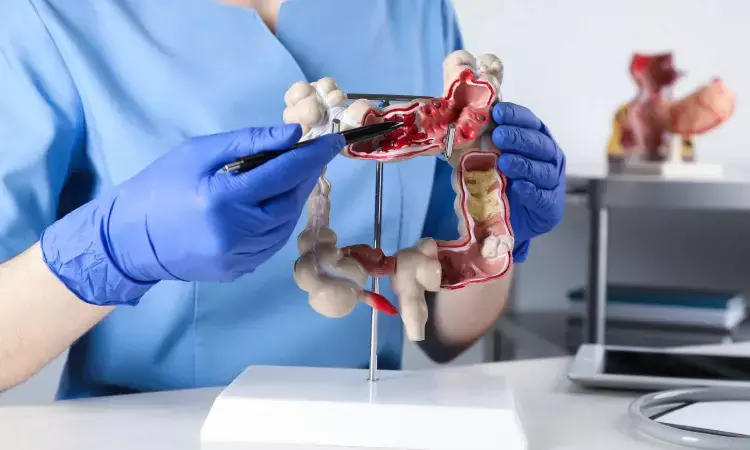- Home
- Medical news & Guidelines
- Anesthesiology
- Cardiology and CTVS
- Critical Care
- Dentistry
- Dermatology
- Diabetes and Endocrinology
- ENT
- Gastroenterology
- Medicine
- Nephrology
- Neurology
- Obstretics-Gynaecology
- Oncology
- Ophthalmology
- Orthopaedics
- Pediatrics-Neonatology
- Psychiatry
- Pulmonology
- Radiology
- Surgery
- Urology
- Laboratory Medicine
- Diet
- Nursing
- Paramedical
- Physiotherapy
- Health news
- Fact Check
- Bone Health Fact Check
- Brain Health Fact Check
- Cancer Related Fact Check
- Child Care Fact Check
- Dental and oral health fact check
- Diabetes and metabolic health fact check
- Diet and Nutrition Fact Check
- Eye and ENT Care Fact Check
- Fitness fact check
- Gut health fact check
- Heart health fact check
- Kidney health fact check
- Medical education fact check
- Men's health fact check
- Respiratory fact check
- Skin and hair care fact check
- Vaccine and Immunization fact check
- Women's health fact check
- AYUSH
- State News
- Andaman and Nicobar Islands
- Andhra Pradesh
- Arunachal Pradesh
- Assam
- Bihar
- Chandigarh
- Chattisgarh
- Dadra and Nagar Haveli
- Daman and Diu
- Delhi
- Goa
- Gujarat
- Haryana
- Himachal Pradesh
- Jammu & Kashmir
- Jharkhand
- Karnataka
- Kerala
- Ladakh
- Lakshadweep
- Madhya Pradesh
- Maharashtra
- Manipur
- Meghalaya
- Mizoram
- Nagaland
- Odisha
- Puducherry
- Punjab
- Rajasthan
- Sikkim
- Tamil Nadu
- Telangana
- Tripura
- Uttar Pradesh
- Uttrakhand
- West Bengal
- Medical Education
- Industry
EOCRC screening can minimize colonoscopies in patients with colon preneoplastic polyps: Study

A new study published in the journal of Cancer Prevention Research showed that an increased risk of colon preneoplastic polyps (PNP) is linked to accelerated aging. Early-onset colorectal cancer (EOCRC) in the individuals under 50 has been on the rise. The American Cancer Society reports that these rates have increased by 2% every year. Despite the number of cases of early-onset colorectal cancer is increasing, the risk remains minimal. While many are at risk, only a small percentage will develop EOCRC.
After that, the individuals sought to get a colonoscopy to remove any precancerous polyps and so prevent EOCRC. Accelerated biological aging is also linked to risk factors for early-onset colorectal cancer, including smoking, alcohol use, obesity, and certain lifestyle choices. By detecting the methylation levels at particular genomic locations that correspond with biological age (BA), epigenetic clocks are able to measure DNA methylation.
Despite the accelerated aging has been linked to the development of cancer, its potential for cancer prevention is yet unknown. One promising explanation for the rise in EOCRC is accelerated aging. This study examined the relationship between preneoplastic polyps (PNP), which include tubular adenomas and sessile serrated adenomas, in the colon and accelerated aging.
A total of 51 patient samples were examined. This study discovered that a year of accelerated aging, as determined by GrimAge, increases the likelihood of having a PNP by 16%. Yet, male sex continued to be the most significant risk factor for PNPs. One of the first studies to examine PNP and accelerated aging in persons under 50 is this one. To address the rise in EOCRC, a risk-stratified strategy to screening would reduce the number of needless colonoscopies and the associated healthcare costs.
According to this research, BA computations using peripheral blood draws may play a significant role in this kind of risk assessment. Overall, there is a chance to create a risk-stratified strategy for screening for colorectal cancer in young people by comprehending the connection between colorectal PNPs and accelerated aging. Despite the small sample size, these results may have significant implications for preventing colon cancer while also offering some explanation for the rise in colon cancer among young individuals.
Reference:
Brown, C. M., Yow, M. V., & Kumar, S. (2024). Biological Age Acceleration and Colonic Polyps in Persons under Age 50. In Cancer Prevention Research (pp. OF1–OF6). American Association for Cancer Research (AACR). https://doi.org/10.1158/1940-6207.capr-24-0317
Neuroscience Masters graduate
Jacinthlyn Sylvia, a Neuroscience Master's graduate from Chennai has worked extensively in deciphering the neurobiology of cognition and motor control in aging. She also has spread-out exposure to Neurosurgery from her Bachelor’s. She is currently involved in active Neuro-Oncology research. She is an upcoming neuroscientist with a fiery passion for writing. Her news cover at Medical Dialogues feature recent discoveries and updates from the healthcare and biomedical research fields. She can be reached at editorial@medicaldialogues.in
Dr Kamal Kant Kohli-MBBS, DTCD- a chest specialist with more than 30 years of practice and a flair for writing clinical articles, Dr Kamal Kant Kohli joined Medical Dialogues as a Chief Editor of Medical News. Besides writing articles, as an editor, he proofreads and verifies all the medical content published on Medical Dialogues including those coming from journals, studies,medical conferences,guidelines etc. Email: drkohli@medicaldialogues.in. Contact no. 011-43720751


